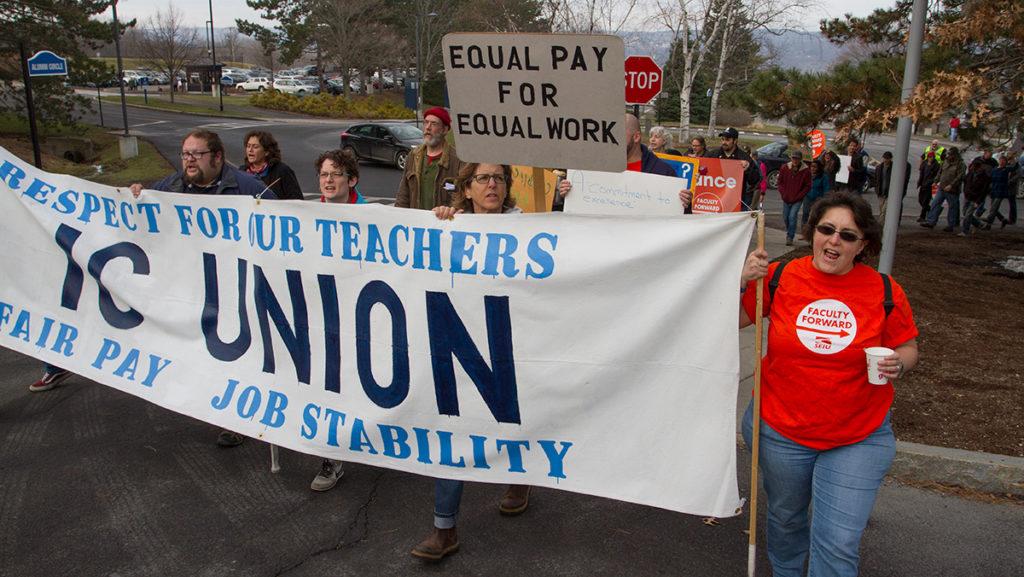Students from Ithaca College and members of the Tompkins County Workers’ Center rallied for the second time this week, the morning of Feb. 24, in support of the contingent faculty unions at the college.
The unions and the college’s bargaining committee had another negotiation session Feb. 24. To garner support, the TCWC rallied again at the Danby Road entrance to the college with IC Students for Labor Action.
The unions — the contingent part time–faculty union and the full time–faculty union — have been negotiating with the college since October 2015 to establish a first-time contract. The part-time faculty has tentatively settled one of its goals with the college, to establish longer–term contracts, but is still negotiating raising its compensation. The full time–faculty union is primarily focused on longer-term job security while also asking for a base minimum pay — a contract element that currently does not exist for them.
Carl Foyer, a volunteer at the Tompkins County Workers Center and the community organizer of Living Wage of New York, said the TCWC has been involved since the beginning of the struggle between the contingent faculty and administration.
“I think there’s a huge amount of frustration,” Foyer said. “They’re getting paid poorly and they just want to be on par with other faculty. Even though some of them don’t work full time, they should at least, per course, get a fair wage.”
The rallies on both Feb. 20 and Feb. 24 were planned to align with admitted student luncheons to let families know about issues facing the contingent faculty, said Rachel Kaufman, a lecturer in the Department of Writing.
“We’re really out here to let administration know that we’re not going to let up the pressure and that we have a ton of community support,” Kaufman said. “Accepted students should see the hypocrisy going on at the college — that they’re selling education as a priority … and not funding it or committing to it at the table.”
At the rally held on Feb. 20, Dave Maley, senior associate director for media relations at the college, said the college believes these demonstrations do nothing to advance negotiations and that it is committed to working with the unions through bargaining.
Megan Graham, assistant professor in the Department of Writing who has been present in negotiations between faculty and administration for the past few sessions said she was hopeful about the bargaining session that afternoon.
“We gave them proposals for longer contracts for full-timers and pay parity for part-timers,” Graham said. “We extended our pay parity proposal to be over five years instead of three, which gives them cost savings and a longer time to implement the plan. We hope they’ll come back and say, ‘Yes, these are good proposals that will improve the quality of education and improve the lives of teachers.”
Regardless of the negotiations, the contingent faculty feels positive about the support from the community. Brody Burroughs, a lecturer in the Department of Art, said the turnout at the demonstrations this week was encouraging.
“We did this on Monday, and there was roughly the same amount of people here,” Burroughs said. “It’s a good show of community support — from our union friends in town, I see my colleagues out here and my students as well. It’s invigorating.”








